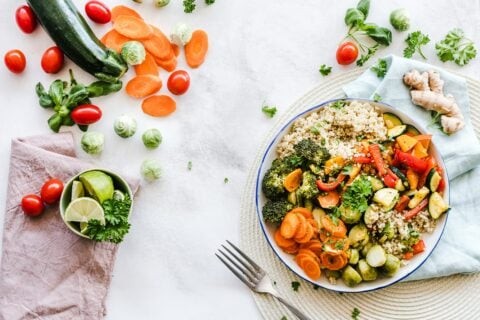Islamic dietary laws are based on the principles of Halal (permissible) and Haram (forbidden), which dictate what foods Muslims cannot eat. Understanding these dietary guidelines is crucial, considering the global Muslim population of over 2 billion people.
Did You Know: The global Muslim population is projected to reach 30% of the world’s population by 2030. While Islam is prevalent in the Middle East and South Asia, Western countries, including the United States, are experiencing a growing Muslim population.
This guide provides a detailed overview of Islamic dietary laws, focusing on the specific foods Muslims cannot consume and the significance of Halal certification.
Understanding the Foundation of Islamic Dietary Laws
The Quran and Hadith outline the core principles of Islamic dietary laws, emphasizing the distinction between Halal (lawful) and Haram (forbidden). Key concepts include:
- Halal (Permissible): Halal refers to foods and drinks permissible under Islamic law. Most foods are considered Halal unless explicitly prohibited by the Quran or Hadith. Halal food must be free from Haram substances and handled according to Islamic guidelines.
- Haram (Forbidden): Haram encompasses anything explicitly prohibited in Islam. This includes pork, blood, alcohol, intoxicants, meat from animals not slaughtered in the name of Allah, and food sacrificed to idols.
- Makrooh (Discouraged): Makrooh refers to foods or actions that are discouraged but not sinful. Avoiding them is recommended to prevent harm to the body or soul, though consumption does not incur punishment.
- Mashbooh (Doubtful): Mashbooh describes foods or practices that fall into a gray area, making it unclear whether they are Halal or Haram. Muslims are encouraged to avoid Mashbooh items to minimize the risk of consuming something Haram.
- Dhabiha (Slaughtered): For meat to be Halal, the animal must be slaughtered according to Islamic rites known as Dhabiha. This involves invoking Allah’s name during slaughter and ensuring the animal is healthy and treated humanely.
A Detailed List of Foods Forbidden in Islam (Haram Foods)
The following table provides a comprehensive overview of foods forbidden in Islam, clarifying what Muslims cannot eat:
| Category | Prohibited Items | Explanation | Quran/Hadith References |
|---|---|---|---|
| 1. Pork and Pork Products | Pork, bacon, ham, gelatin, lard, etc. | Pork is explicitly forbidden in Islam. | Surah Al-Baqarah (2:173), Surah Al-Ma’idah (5:3), Surah Al-An’am (6:145) |
| 2. Dead Meat (Carrion) | Animals that died naturally, from disease, or were not properly slaughtered | Consumption of dead animals not slaughtered according to Islamic guidelines is forbidden. | Surah Al-Baqarah (2:173), Surah Al-Ma’idah (5:3) |
| 3. Blood | Blood and blood-based products | Consuming blood in any form is forbidden. | Surah Al-Baqarah (2:173), Surah Al-Ma’idah (5:3) |
| 4. Alcohol and Intoxicants | Alcoholic beverages, intoxicating drugs | All forms of intoxicants are forbidden in Islam. | Surah Al-Ma’idah (5:90-91), Surah Al-Baqarah (2:219) |
| 5. Improperly Slaughtered Animals | Animals not slaughtered in the name of Allah or slaughtered improperly | Animals must be slaughtered by invoking Allah’s name. | Surah Al-Ma’idah (5:3) |
| 6. Carnivorous Animals & Birds | Lions, tigers, eagles, hawks, animals with fangs or talons | Carnivorous animals and birds of prey are forbidden for consumption. | Based on Hadith (Sahih Muslim, no: 1934) |
| 7. Reptiles and Insects | Snakes, lizards, most insects (except locusts) | Most reptiles and insects are Haram, with exceptions like locusts. | Based on Islamic jurisprudence |
| 8. Certain Marine Animals | Eels, frogs, shellfish (shrimp, lobster, crab) | Opinions vary among scholars; some marine animals are considered Haram by certain Islamic schools. | Differences in interpretation of Hadith and Islamic texts |
| 9. Products with Haram Ingredients | Processed foods with gelatin, emulsifiers, additives from Haram sources | Any food products containing Haram ingredients are also forbidden. | Principle based on Islamic jurisprudence |
Exception (Darura): The concept of “Darura” (necessity) allows a Muslim to consume Haram food in extreme circumstances, such as starvation or the absence of Halal alternatives, to preserve life, as the preservation of life takes precedence over dietary restrictions.
Source: Surah Al-Maa’idah (5:3) and Surah Al-An’am (6:119).
Common Haram Food Additives and Ingredients to Be Aware Of
Non-Halal food additives and ingredients can make foods Haram for Muslims. Here are some common examples:
| Ingredient | Where is it used? | Halal Consideration |
|---|---|---|
| Gelatin | Candies, marshmallows, yogurts, capsules, often derived from pork or non-Halal slaughtered animals. | Must be sourced from Halal-slaughtered animals or be plant-based to be considered Halal. |
| L-Cysteine | Bread products, can be derived from human hair or poultry feathers. | The source needs to be confirmed; human or non-Halal animal origins make it questionable for Halal. |
| Mono-Diglycerides | Emulsifiers that can be sourced from animal fats, including pork, or from plant-based sources. | Requires verification of the source; plant-based sources are generally considered Halal. |
| Rennet | Used in cheese-making, derived from the stomach lining of calves. | Halal only if the calf was slaughtered according to Islamic law. |
| Alcohol | Beverages and as a component in food flavorings, sauces, and baked goods. | Any trace of alcohol in food is considered Haram and not permissible in a Halal diet. |
| Carmine | A red dye made from crushed cochineal insects, often used in cosmetics, candy, and drinks. | Its insect origin typically makes it Haram. |
| Enzymes | Used in food processing, can be derived from animal or microbial sources. | Halal if sourced from Halal-slaughtered animals or microbial sources; non-Halal animal origins make them Haram. |
Finding Halal Food in Non-Muslim Countries
Finding Halal food in non-Muslim majority countries can be challenging but is becoming increasingly easier due to the growing Muslim population and demand for Halal products.
Did You Know: In 1970, only 10 American grocery stores carried Halal products. By 2012, over 2,300 American grocery stores carried Halal products. This number is projected to exceed 7,000 by 2030.
Here are three guidelines to help you find Halal food in non-Muslim majority countries:
-
Look for a Recognized Halal Certification:
 Halal Certified Food
Halal Certified FoodSeek products with a well-accredited Halal certification label. This guarantees the food has been prepared according to Islamic standards.
-
Choose Vegetarian Items:
Vegetarian or vegan items are often safer options in the absence of Halal-certified meat, as they typically exclude animal-derived components. However, always check for non-Halal ingredients.
-
Carefully Read Ingredient Labels:
Always review ingredient labels closely. Familiarize yourself with potentially Haram ingredients and be cautious of vague terms like “natural flavors” or “enzymes,” which may contain non-Halal substances.
Halal Certification and Labels: Ensuring Compliance
Halal certification is a crucial process that ensures food products and other consumables meet Islamic dietary guidelines.
This process involves scrutinizing not only the ingredients but also the processing, packaging, and handling methods to prevent cross-contamination with Haram substances.
Here’s what you need to know about Halal certification and labels:
- For Halal-certified products, every ingredient is examined to ensure it is Halal. This includes verifying the source of animal-derived ingredients, confirming the absence of alcohol or non-Halal additives, and ensuring no contamination occurs.
- Halal certification labels are not limited to food. They can also be found on cosmetics, pharmaceuticals, personal care products, and even packaging materials. Any product that might contain ingredients of animal origin or alcohol requires Halal certification.
With the increasing availability of Halal-certified products globally, Muslim consumers can have greater confidence in their choices.
Furthermore, businesses pursuing Halal certification often find it opens new markets and builds consumer trust. Research indicates that Halal consumers are willing to pay an average of 13% more for Halal-certified products.
In Summary
To effectively understand what Muslims cannot eat:
- Pay close attention to common food additives.
- Request Halal certification from manufacturers.
As the demand for Halal products continues to grow worldwide, organizations are committed to ensuring the highest standards of Halal consumption for consumers and businesses.
Frequently Asked Questions (FAQs)
Q1. What are the main food categories considered Haram (forbidden) in Islam?
A: The main categories of Haram foods include pork and pork products, animals not slaughtered according to Islamic law, blood, alcohol, and any food containing ingredients derived from these sources.
Q2. Is gelatin Halal?
A: Gelatin is Halal only if it is derived from Halal sources, such as fish or animals slaughtered according to Islamic law. Gelatin derived from pork or non-Halal animals is Haram.
Q3. What should Muslims look for on food labels to ensure products are Halal?
A: Muslims should look for a recognized Halal certification label on food products. They should also check for any Haram ingredients such as gelatin, alcohol, or lard, and be cautious of ambiguous terms like “natural flavors” or “enzymes.”
Q4. Can Muslims eat meat not slaughtered according to Islamic law if labeled organic or free-range?
A: No, even if meat is labeled organic or free-range, it must still be slaughtered according to Islamic law (Dhabihah) to be considered Halal. The method of slaughter is crucial in determining permissibility.
Q5. Is alcohol in food or cooking permissible in Islam?
A: No, any form of alcohol, whether in beverages, cooking, or as an ingredient in food, is considered Haram (not permissible) for Muslims to consume.
